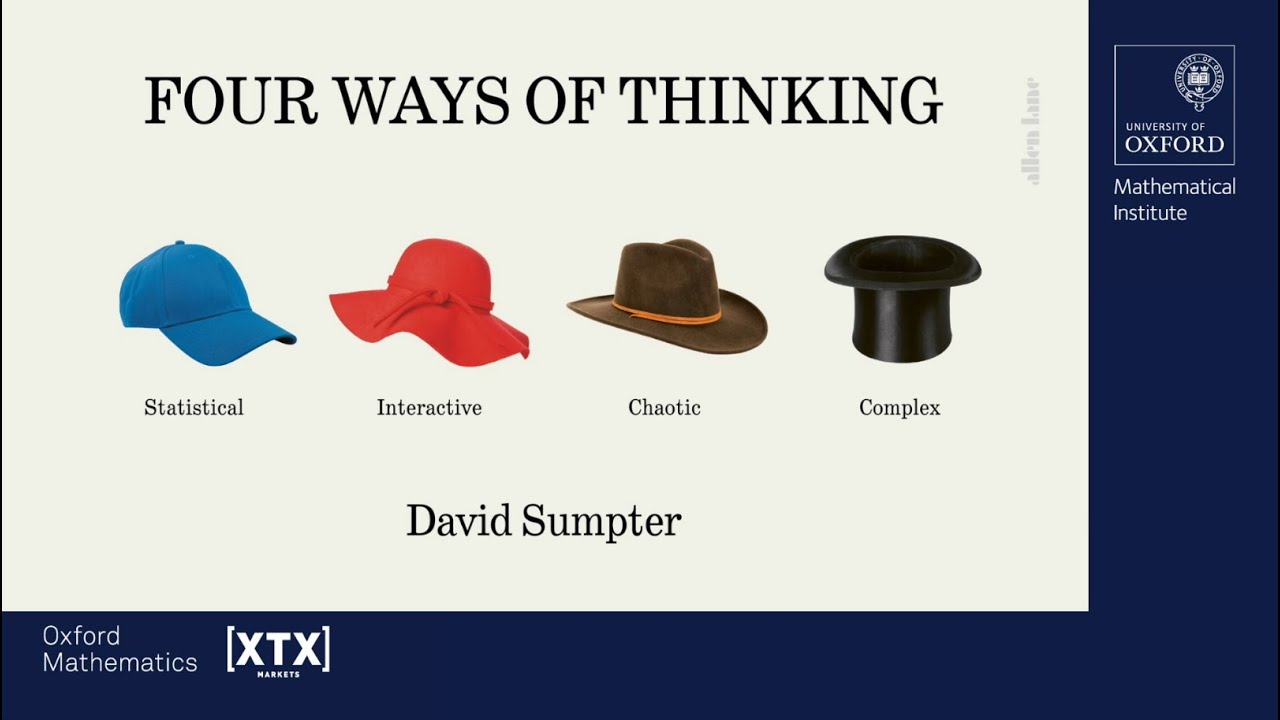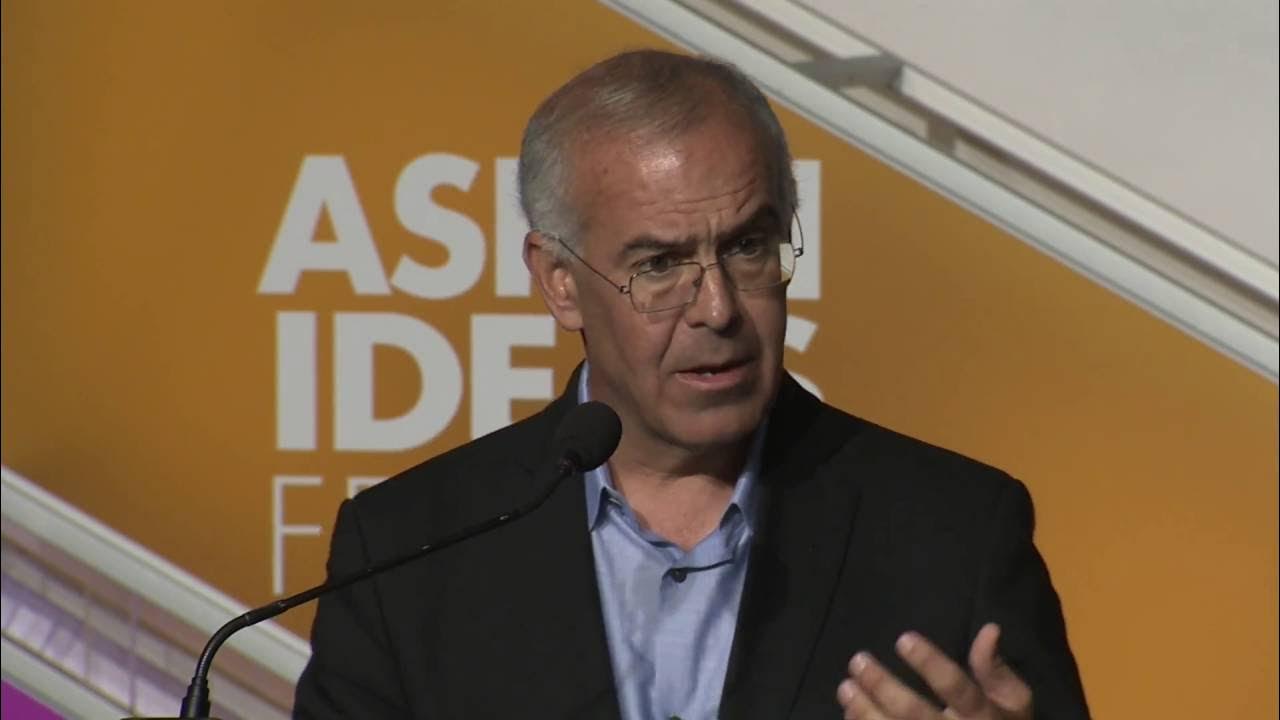Michael Hopkins: My best advice to young mathematicians (2022)
TLDRIn this engaging talk, the speaker humorously reflects on the life of a mathematician, highlighting the unique experiences and mindset that come with the territory. From the 'spam filter' that often overlooks social cues to the profound connections formed with other mathematicians, the speaker emphasizes the importance of community in the field. Personal anecdotes and insights into the process of transitioning from learning to inventing in mathematics are shared, along with the joy of discovering simple yet surprising truths in math, showcasing the beauty and challenges of the discipline.
Takeaways
- 😊 Mathematicians often find themselves in informal situations due to focusing on math over social norms, like dressing up.
- 🤝 Connecting with people and building relationships is crucial to becoming a successful mathematician.
- 🔢 Early fascination with numbers and mathematical concepts often sparks a lifelong passion for math.
- 📚 The proof that the square root of two is irrational was a significant moment in understanding the beauty and logic of math.
- 👥 Mentors and teachers play a vital role in recognizing and nurturing mathematical talent in students.
- 🌐 Math is not just an individual pursuit; it’s deeply connected to a community of learners and practitioners.
- 🔍 Transitioning from learning math to creating new mathematical ideas is a challenging but essential step in becoming a professional mathematician.
- 🤔 Embracing not understanding and valuing the journey toward clarity is key to the mathematical process.
- 🧑🏫 Teaching and mentoring others in math fosters deep, cross-generational friendships and collaborations.
- 🎩 Fascination with simple, quirky concepts like taking off a vest without removing a jacket can inspire a lifelong interest in specific areas of math.
Q & A
What is the common experience shared by mathematicians and rock stars as described in the transcript?
-The common experience is that both mathematicians and rock stars often find themselves in situations where the audience is dressed much nicer than they are. However, the reasons are different: rock stars because they are considered cool, and mathematicians because they have a 'giant spam filter in their brain' that often overlooks social cues like dressing up for events, allowing them more mental space to focus on mathematical thinking.
Why do mathematicians sometimes overlook dressing up for events?
-Mathematicians may overlook dressing up for events because they have a mental 'spam filter' that allows them to disregard non-mathematical concerns, such as social norms, in order to focus more on their mathematical thinking.
What is the significance of the square root of two being an irrational number in the speaker's journey with mathematics?
-The realization that the square root of two is an irrational number was significant for the speaker because it demonstrated the power of organized thought in mathematics. It was a moment that made the speaker appreciate the structured and logical nature of mathematical proofs, which is something that appealed to them about mathematics.
How did the speaker's teacher play a role in their early interest in mathematics?
-The speaker's teacher recognized the speaker's boredom with the material being taught and allowed them to read ahead in the textbook. This led the speaker to discover the proof that the square root of two is irrational, which sparked a deeper interest in mathematics.
What is the role of community in the speaker's experience as a mathematician?
-The speaker emphasizes the importance of community in their experience as a mathematician. They mention that their understanding and growth in mathematics have been significantly influenced by the people they've met and interacted with, including teachers, students, and colleagues, who have helped them learn and see things in new ways.
Why did the speaker become an algebraic topologist?
-The speaker became an algebraic topologist partly due to an early encounter with a book on mathematics that included a section on algebraic topology. The intriguing image of a man taking off his vest without removing his jacket piqued the speaker's curiosity and led them to want to learn more about the subject.
What is the 'vest trick' mentioned in the transcript, and how does it relate to the speaker's connection with other mathematicians?
-The 'vest trick' refers to a man in a book who could take off his vest without removing his jacket. The speaker found this intriguing and wanted to learn more about algebraic topology, which was mentioned in the same context. This curiosity led them to connect with other 'math people' who appreciated the trick, helping them feel part of the mathematical community.
How did the speaker's interaction with a graduate student named Henry Seaton influence their understanding of mathematics?
-Henry Seaton, a graduate student, helped the speaker by pointing out a mistake they were about to make on the chalkboard. This interaction highlighted the importance of intuition in mathematics and the value of having someone who can recognize and correct errors, which was meaningful to the speaker.
What is the significance of the speaker's experience with personal relationships and how it relates to their understanding of mathematics?
-The speaker's graduate student, Ina Zakharovic, helped them understand personal relationship issues by framing them as an abstract formal system. This experience showed the speaker how mathematical thinking can be applied to understand and navigate personal situations, demonstrating the versatility of mathematical reasoning.
What advice does the speaker give about the transition from learning mathematics to inventing it as a professional mathematician?
-The speaker advises that the transition from being a student to inventing mathematics as a professional can be challenging. They suggest that it's important to recognize and value the state of not understanding, as this is a common state for mathematicians and is part of the process of moving towards understanding.
How does the speaker's story about their sister and birth years illustrate the joy of simple mathematical surprises?
-The story about the speaker and their sister turning ages that were each other's birth years demonstrates how even simple mathematical coincidences can still surprise and delight a professional mathematician. It shows that the joy of discovering and appreciating mathematical truths is not limited to complex problems.
Outlines
😅 The Mathematician's Dilemma: Dress Code and Brain Filters
The speaker humorously describes the life of a mathematician, highlighting the common experience of being less concerned with dress codes due to a 'spam filter' in their brains that prioritizes mathematical thinking. They reflect on the importance of community and personal connections in their journey, emphasizing the role of mentors and peers in shaping their mathematical interests and career. The speaker also shares their initial fascination with numbers and the profound impact of learning the proof that the square root of two is irrational, which sparked their love for the organized nature of mathematical proofs.
🤔 The Intuitive Side of Mathematics and the Role of Community
This paragraph delves into the speaker's personal journey towards becoming an algebraic topologist, influenced by childhood curiosity and a serendipitous encounter with a book on mathematics. The speaker recounts the significance of intuition in mathematics, as illustrated by a memorable interaction with a graduate student named Henry Seaton. They stress the importance of community in mathematical growth, suggesting that feeling connected to a group of mathematicians can lead to a deeper understanding of the field. The speaker also shares the joy of academic friendships across different age groups, highlighting the unique bonds formed in the world of mathematics.
🧐 Embracing the Unknown: The Transition from Student to Mathematician
The speaker discusses the challenges of transitioning from learning mathematics to creating it, a significant hurdle for many graduate students. They emphasize the value of not knowing and the importance of respecting the state of not understanding as a natural part of the mathematical process. The speaker encourages a culture that honors the journey towards understanding rather than just the achievement of it. They also share a personal anecdote about their own moments of confusion and the realization that such moments are universal among mathematicians, regardless of their age or experience.
🎉 The Enduring Wonder of Simple Mathematical Truths
In the final paragraph, the speaker shares a light-hearted story about a mathematical realization involving their own and their sister's birth years, which, despite its simplicity, still managed to surprise and delight them. This story serves to illustrate the enduring joy and wonder that can be found in the most basic mathematical truths, reflecting the speaker's ongoing passion and curiosity for mathematics. The speaker concludes with a warm thanks to the audience, leaving them with a sense of the continual discovery and connection that math offers.
Mindmap
Keywords
💡Mathematician
💡Algebraic Topology
💡Intuition
💡Community
💡Rational Numbers
💡Proof
💡Not Understanding
💡Graduate Students
💡Connection
💡Abstract Formal System
💡Surprise in Math
Highlights
Mathematicians often forget to dress up for events because their brains are preoccupied with math.
Rejoining the community after two years of isolation has made the speaker appreciate the human connections in mathematics more.
The speaker's interest in math was sparked by personal connections and encouragement from others.
Counting and calculating square roots were early fascinations for the speaker, demonstrating a natural inclination towards math.
Learning the proof that the square root of two is not a rational number was a pivotal moment in the speaker's mathematical journey.
A teacher recognizing the speaker's potential and allowing them to read ahead was crucial to their development.
The importance of recognizing and nurturing potential in students, as learned from years of teaching and advising graduate students.
A book on algebraic topology inspired the speaker to pursue this field, highlighting the impact of accessible resources.
Connecting with like-minded individuals, such as graduate students at Northwestern, was vital to the speaker's growth in mathematics.
The value of intuition in mathematics, illustrated by a friend's ability to identify mistakes through intuition.
The speaker emphasizes that struggling with certain math concepts is normal and not a sign of inadequacy.
Transitioning from learning math to inventing it is a significant challenge that the speaker and many students face.
The importance of embracing and respecting the state of not understanding in the process of learning mathematics.
An amusing realization about age and birth years demonstrates the joy of discovering simple, surprising connections in math.
The enduring joy of mathematics lies in being constantly surprised and delighted by new insights and connections.
Transcripts
Browse More Related Video

Mathematics and sex | Clio Cresswell | TEDxSydney

Four Ways of Thinking: Statistical, Interactive, Chaotic and Complex - David Sumpter

How to Humor Your Stress | Loretta LaRoche | TEDxNewBedford

The Four Commitments: The Choices That Create Your Life

50 minutes of Addition | Learn to count - Level 1 | 123 - Number cartoon for Kids | @Numberblocks

The Mindset of a Champion | Carson Byblow | TEDxYouth@AASSofia
5.0 / 5 (0 votes)
Thanks for rating: